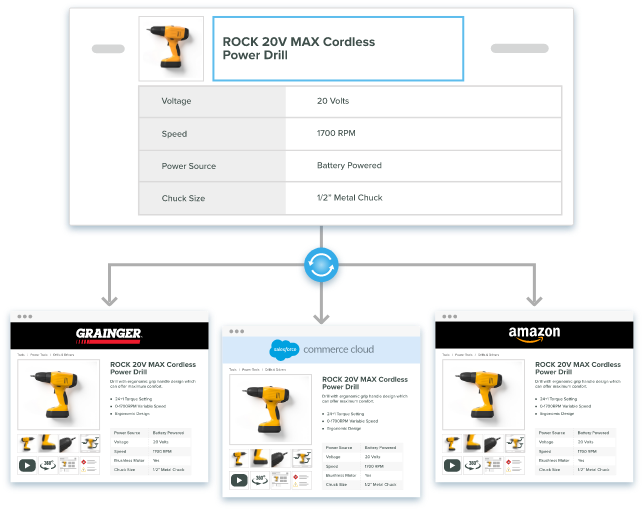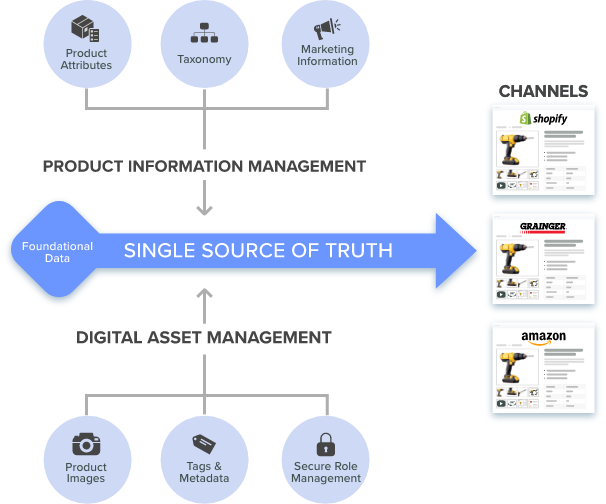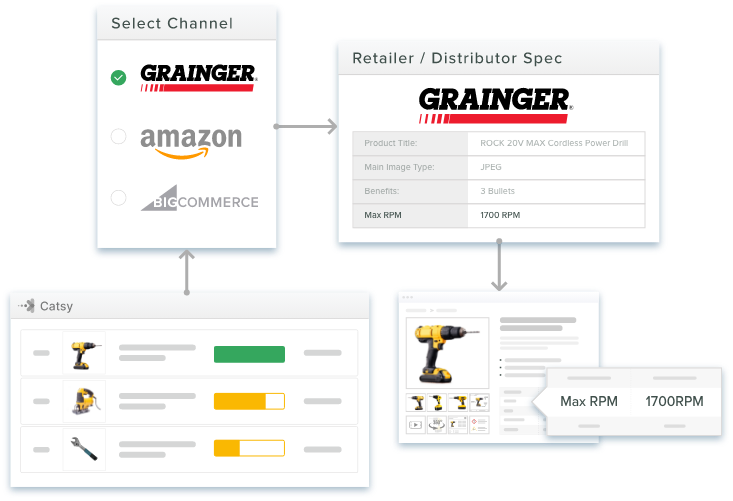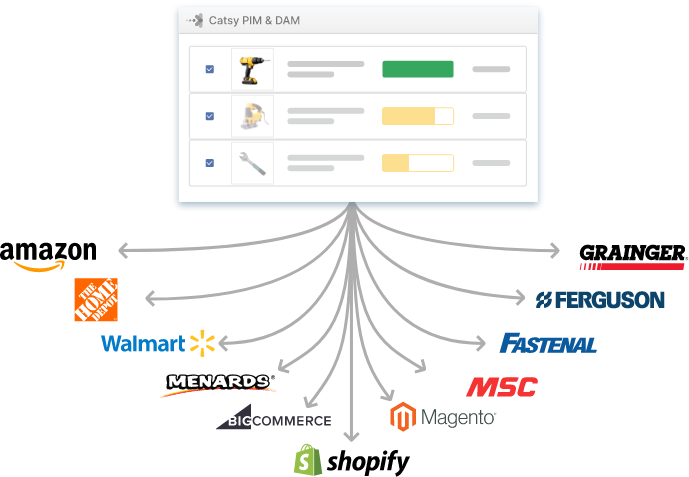Two blocks from my house, a small neighborhood market sits in a picturesque frame, with beautiful mountains as the backdrop. I go there enough that everyone there knows my name, and they have come to learn some of my favorite snacks to get on a Friday night. Going there seems like a trip to see a friend rather than a chore to get groceries.
My favorite snacks are sometimes one or two dollars more there. Also, because of the size of the market, they carry only a limited selection of products. Why do I still go there? Because of the experience, an experience tailored to how I like to shop.
E-commerce brings a lot of opportunities to provide these same experiences in the virtual world. Consumers have grown accustomed to and expect these experiences as well. Developing a marketing strategy that provides for these experiences is a proactive way to stand out to customers and assists in earning repeat business.
Selling to customers with an effectively managed database increases a marketer’s chance of immediate purchases. In addition, marketers must utilize the marketing power of multi-channel marketing as only focusing your marketing tactics on one channel is not enough, so you need the solid backing of a PIM channel system.
What is a channel for PIM (Product Information Management)?
A PIM channel is a defined endpoint usually set apart for a product or a group of products. Examples of marketing channels include e-commerce websites, distributor websites, and catalogs (digital or print PDF).
Channels allow you to tailor your customer experience to multiple audiences. Every channel has attributes and governing rules they must follow. Since the data requirements of each platform differ, it is impossible to transfer all information from one store to another, which is where PIM comes in.
PIM enables a channel to work as a filter. No matter the amount of information available in the database, only useful or relevant information to that channel is transferred. A PIM channel can be a website, a print catalog, a mobile application, and so on, and usually comes with several attributes, including one or more enabled locales or languages, one or several trading currencies, a product category tree, and a content completeness grader.
There are many different groups of channels, and they include:
- E-commerce channels
- Distribution channels
- Retail channels
- Marketplaces
To effectively conquer the multi-channel marketing strategy, online marketers must utilize what works, including working from an organized system. This article explains detailed information about each channel group and how PIM not only helps but is essential for multi-channel management.

How PIM Is Essential for Multi-Channel Management:
Multi-channel marketing will give your business a solid chance to break into the online marketing space, putting you ahead of the competition. However, it is always important to be thorough when planning to scale.
Being thorough involves keeping an organized database to ensure that you don’t get dragged down by data or information problems while building marketing strategies. An excellent way to tackle this is by employing effective management software solutions like PIM. Some of the ways through which PIM helps achieve practical multi-channel marketing include:

Single Source of Truth
PIM stands for Product Information Management. As the name implies, it manages your product information by providing you with a centralized database system.
With PIM, you have a central information system to retrieve and store data for your business’s use. PIM has automated features that support workflow and improve productivity with grades and pre-validation for your product data to ensure enriched product content.
In addition, PIM software allows you to configure as many channels as you want.
When you have a channel connected to PIM, it ensures that only vital information needed by that channel goes to it.
In other words, if your database contains a hundred product attributes about a product because your website requires it, and your other channel needs thirty of those attributes, the automated feature on product information management software will ensure that only the thirty required attributes leave the system to that channel.

PIM Supports Channel Templates
Another benefit of employing PIM is that you can tweak features to support the attributes concerned with the connected channels.
Since PIM contains automated features that validate and complete product data while following the data governing policies for each channel, marketers have no cause for worry.
In addition to supporting channel templates, the best PIM software also supports localization templates. Since most of the marketplaces mentioned in this article also provide international services, there are bound to be language barriers.
However, implementation of PIM can cancel that barrier as the system comes enabled with different language options, thus allowing you to provide personalized services to people of other regions.
Doing this shows that you value your customers and constantly aim to be customer-centric, an essential factor in today’s marketing sector.

Publish via API/CSV Export
To manage your multi-channel marketing effectively, you must update accurate product information. Sometimes, this data might need an update or removal from this system. Things may become challenging if you manually update your data with Excel files and have yet to integrate PIM into your e-commerce system.
E-commerce fulfillment PIMs with excellent API features can help organizations automate, coordinate, manage, and streamline their operations, including order fulfillment, labeling, invoicing, printing package information, tracking, and notifications.
As a result, you’ll need to integrate an API-enabled software solution into your shipping and logistics to develop a robust platform for your E-commerce organization.
Catsy’s PIM comes with API features that let you publish information without the additional stress of completing individual workflows.
A comprehensive guide to popular channels supported by PIM:

eCommerce Channels
E-commerce websites help online marketers find their customers through available tools like marketing tools, shipping tools or logistics, customer engagements, and payment services. Through e-commerce channels, product manufacturers can find suitable marketing systems to scale their businesses.

Shopify
Shopify is a Canadian international e-commerce company, and it has its headquarters in Ottawa, Ontario. It is a full-featured e-commerce platform that allows you to build, grow, and manage a company. You can set up an online store and sell your products using Shopify subscription-based software. Shopify store owners can also use Shopify POS, point-of-sale system, and related hardware to trade in physical locations.
The e-commerce store works to unify your work into a central command system. Shopify will help you sync your inventory to manage both stores from one account and any device if you have both online and offline presence for your business.
Because it is a cloud-based system, Shopify store owners can access their store from any connected device. The platform takes care of software and server upgrades and maintenance, which allows you to manage and access your company from any location with an internet connection.
Some of the benefits that come with signing up with Shopify are:
- A customizable storefront where you can immediately create web pages, make blog posts and sell your products.
- A Shopify checkout
- Shipping partner, which involves setting up a shipment method that works for you
- A back-office that allows you to manage your store activities from your phone
- A marketing platform through which you can reach more customers with built-in blogs and SEO tools.
BigCommerce
BigCommerce is a SaaS company. Like Shopify wholesale, it is a cloud-based company that offers a nice set of online tools for effective store management. Some of the features they provide business
owners include payment methods, analytics, order fulfillment, and content management.
BigCommerce is a large e-commerce software platform that includes everything a startup or established company needs to develop and run an online store. It has a solid foundation, a user-friendly UI, and built-in features.
BigCommerce can suit your new or expanding online business if you’re looking for an all-in-one e-commerce software platform.
Some of the free tools you’ll have access to on BigCommerce include:
- A customizable storefront where you can immediately create web pages, make blog posts and sell your products.
- A Shopify checkout
- Shipping partner, which involves setting up a shipment method that works for you
- A back-office that allows you to manage your store activities from your phone
- A marketing platform through which you can reach more customers with built-in blogs and SEO tools.
According to Ipsos research, the average year-over-year growth rate for BigCommerce users is 28 percent. In addition, BigCommerce’s pricing system favors every business level, so as a startup, you pay less and only have to increase your payment as your market grows.
Magento
Magento is an open-source e-commerce platform designed to fit the needs of all types and degrees of retailers. Magento users benefit from a customizable shopping system that gives them complete control over their online stores’ style, content, and overall functionality, which you can further extend with software tools. The e-commerce platform host also includes a long list of tools to assist shops in improving their customers’ experiences, including search engine optimization, effective marketing, and various plug-ins and themes.
Magento’s key feature allows organizations to build several e-commerce storefronts to sell products to different consumer personas.

Distribution Channels
Distribution channels work for manufacturers to help get their products or services to the final consumers. The succession of firms, vendors, or other intermediaries through which your items must pass before reaching your final consumers is known as your distribution channel. Depending on your business and products, these channels may comprise wholesalers, physical shop retailers, online marketplaces, or shipping firms.
Choosing the right distribution channel for your business is crucial. What you choose impacts how your products are handled, how soon they are delivered, and how efficiently you can get them into customers’ hands.
Manufacturers need to offer a variety of distribution channels through which consumers can quickly obtain their products.
Businesses must choose a channel or channels that allow for effective sales generation and customer ease of access based on the diversity of the distribution company or any other industry in the distribution process.
Grainger
Grainger is America’s business-to-business trusted source for maintenance, repair, and operations (MRO) supplies and other associated products and services with an extensive product portfolio. Founded by William W. (Bill) Grainger in 1927, Grainger provided developments in safety, material handling, metalworking, and services like inventory management and technical assistance to more than 5 million organizations and institutions worldwide.
Grainger supplier program supports businesses that are still underrepresented and local. The supplier diversity program is especially suitable for tools manufacturers as the platform specializes in providing quality products in every tools category, from cutting to fasteners, trash bags, and more.
However, there are a few requirements to becoming one of their suppliers, and they are as follows:
- You must be a US resident
- You must provide business ownership proof
- You must control and operate 51% of the business
In a way, the Grainger distributor alliance program classifies them as resellers, as they are also paramount in connecting customers who order products to suppliers that have them.
MSC
MSC stands for Mediterranean Shipping Company, a global business specializing in shipping and logistics. It is a worldwide container shipping leader with a reputation for providing international service with local knowledge. The Mediterranean shipping company has been around since 1970 and is presently the most extensive container shipping line.
Over the years, the company has gained access to a global network of integrated road, rail, and maritime transportation capabilities, through which they provide international shipping services with local understanding.
MSC has grown to the world leader in container shipping with a fleet of 600 vessels and over a hundred thousand employees. The MSC shipping lines operate on more than 200 commercial routes and 315 ports.
For manufacturers, goods can get to your local and international customers with no cause for alarm or doubts. MSC gained extensive knowledge of the audiences they serve, and they also have skilled personnel that ensures your containers get to the correct destinations.
Fastenal
Fastenal Company is a wholesale distributor of building and construction products like bolts, screws, nuts, anchors, washers, and sockets. According to the company’s website, Fastenal also supplies safety gear and tools. The business has been in existence for more than 50 years, with the last 30 years spent on the Nasdaq. Fastenal also refers to itself as a supply chain solution company.
Through its subsidiaries, Fastenal Company operates as a wholesale distributor of industrial and construction products in the United States, Canada, Mexico, North America, and abroad. Fastenal is a brand that sells fasteners and other industrial and construction products.
Before you can buy or become a vendor on Fastenal, it is required that you open an account with them.
Ferguson
Ferguson is a British-American multinational company specializing in quality plumbing, building supplies, and HVAC products. They are the leading distributor of plumbing and heating products with their head office in Wokingham, UK.
Ferguson employees are experts in their services to customers that reach them. So if you specialize in plumbing, heating, or other home supply products, heading over to their website will be an excellent place to start.
Some of the products and services supplied by Ferguson include facility supplies, waterworks, building services, commercial mechanical, fire and fabrication, and so on. The company aims to make customer projects simple, prosperous, and sustainable. The company and its associates provide services to all 50 states, Mexico, Puerto Rico, and the Caribbean.
Zoro
Distributors can use Zoro to merchandise their inventory digitally. The company provides partners access to channels where they might not otherwise succeed. This allows Zoro to reach out to more customers and sell more items.
They also provide value to small business clients by acting as a one-stop-shop for their needs.

Retail Channels
Retail channels sell or distribute products for immediate use or consumption to end-users.
Retailers help with the final stage of the supply chain: selling products to potential clients. They are a sort of indirect product distribution in which the producer does not sell items directly to buyers.
A retailer purchasing large quantities of products from a manufacturer or producer and selling lesser amounts of the same commodities to consumers for a profit is known as a retail business. Consumers purchase goods through various retail channels.
Home Depot
Home Depot is a home improvement store that sells various products.
Customers can get building material products such as home improvement, lawn and garden, décor, facility maintenance, repair, and operations products from the company, and services like home improvement installation and tool and equipment rental.
Home Depot offers services to two kinds of customers, DIY customers and the pro group, which provides for other professionals.
To sell on Home Depot, You must be a US citizen or have US Resident Alien status, and you must own 51 percent of the company you represent.
Wayfair
On five different websites, Wayfair sells nearly 14 million items. It also has 80 “house brands,” which aren’t actual brands but are used to categorize and merchandise products based on decorating aesthetics. It does not manufacture the products it sells. Instead, it relies on a drop-shipping model. Wayfair purchases items from its suppliers and ships them to the consumer when they order.
Costco
Costco is an American company that runs a membership-only retail corporation. Costco Wholesale Corporation operates an international network of membership warehouses, mostly known as “Costco Wholesale,” that offer high-quality, name-brand merchandise at much lower prices than typical wholesale or retail sources.
They do not provide free or discounted memberships, but you can rest assured that you will soon recoup the membership cost once you begin shopping. There are significant discounts on various Costco Services, which you can use daily in your professional and personal life.
Lowes
Lowe’s Companies, Inc., or just Lowe’s, is a home improvement retailer based in the United States. The Mooresville, a North Carolina-based company, operates a retail store chain in the United States and Canada.
The company provides home services and accepts people who offer the same benefits as independent contractors.

Marketplaces
An online marketplace is usually an app or a website that allows buyers to purchase products from various sources. The website operators have no product to sell in the online market, but they showcase other people’s product inventory.
An online market can sell digital and physical goods and any business type, including B2B and B2C businesses.
Since the marketplace operators do not sell products, they make money off the commission of sales made using their platform. Examples of online marketplaces include Amazon, Walmart, and Facebook.

Amazon
Amazon has the most extensive customer base, including 90 million prime members and 310 million active users.
The good thing is common, the first place people look to find products they’d like, and most often, there is no required advertisement on your part. In addition to that, Amazon leverages many marketing options, including affiliate offers.
Amazon’s selling technique is sufficient if you want to get started immediately. However, if you sell items in specialty categories like collectibles or fine art, you must have a professional plan and apply for a license.
Walmart
Walmart is another massive marketplace with more than 385 million web visits in 2020. In recent years, they’ve gotten into the online marketplace game by allowing independent shops to sell alongside Walmart products on their site.
You pay no monthly fee to get started to sell on Walmart. However, there are charges on every product you sell, known as the seller fee.
Facebook Marketplace
You might have seen Facebook as a social media channel before now, but that isn’t the only thing Facebook does. Facebook has also created a way to effectively leverage the 2.8 billion user’s opportunity to market your product for free.
Because it is one of the largest online marketplace platforms, you think your business will get lost among many users. But you can sell your products locally, narrowing and targeting your customer base.
Facebook Marketplace features anything from real estate, yachts, automobiles, antiques to fragrant candles, flowers, and custom-made furniture. A retail e-commerce inventory system is also accessible on Facebook Marketplace. However, it is presently only available to sellers in the United States.
In Conclusion
A multi-channel marketing plan is now a requirement, not an option. Targeting the correct audience at the right time has become critical; if you fail to do so, your competitors will not hesitate to steal your clients.
There will be ups and downs with this plan, especially when managing the vast amount of data that comes with achieving its success. Still, with the help of PIM software and digital asset management software, you will be able to create a plan that will allow you to have the same experience as my favorite little market.
Start your free trial of Catsy PIM and DAM software and see it in action today.
What is a channel?
A channel is a defined endpoint usually set apart for a product or a group of products. PIM channels include different marketing platforms to sell your product or services. When it comes to PIM, channel means the other platforms you send product information to for marketing purposes.
Why should I practice Multi-channel marketing?
It would be best to have a channel to effectively compete in the market as it is one of your competitors’ marketing strategies. Multi-channel marketing gives you access to a much larger audience.
Are all channels the same?
No, there are different channels available on the internet; you must find one which suits your business and explore its benefits.
What is PIM?
PIM stands for product information management. It is software that, when integrated into an online store, creates a single source of truth for your product content, optimizing it for richness and syndicating it to meet sales channel requirements.
How does PIM help my Multi-channel marketing?
PIM creates a single source of truth for your product data to keep an organized database while managing numerous marketing channels. In addition, PIM has automated features that work to make sure you have enriched product content for your channels.
What is Catsy?
Catsy simplifies the way brands manage and publish product content across online, retail, and distribution channels. With a cloud-based

